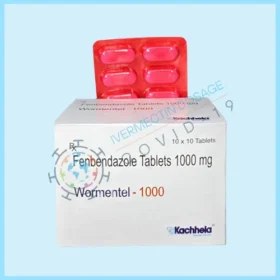- Your cart is empty
- Continue Shopping
Fenbendazole: Overview, Uses, and Emerging Interest
Fenbendazole is a broad-spectrum antiparasitic drug primarily used in veterinary medicine. It belongs to the benzimidazole class of medications and is widely used to treat intestinal parasites in animals such as dogs, cats, horses, cattle, and other livestock. While originally developed for animals, Fenbendazole has recently gained attention for its potential off-label use in humans, particularly in the context of cancer treatment.
What Is Fenbendazole Used For?
In veterinary applications, Fenbendazole is prescribed to eliminate a range of gastrointestinal parasites, including:
-
Roundworms
-
Hookworms
-
Whipworms
-
Tapeworms
-
Giardia (a common protozoan infection)
Fenbendazole works by disrupting the energy metabolism of parasites, leading to their death and expulsion from the body. It is considered safe and effective when used as directed and is typically administered in oral form—either as a tablet, paste, or powder mixed with food.
Dosage and Administration in Animals
The dosage depends on the animal species, weight, and type of infection being treated. For example:
-
Dogs: Often given 50 mg/kg once daily for 3 to 5 consecutive days
-
Horses and cattle: Given in paste or suspension form, typically for single or repeated treatments
Veterinarians may adjust the dosage for more severe infestations or specific parasites.
Human Interest: Cancer and Fenbendazole
In recent years, Fenbendazole has gained unofficial popularity among cancer patients due to anecdotal reports suggesting potential anticancer effects. Some individuals claim tumor regression or symptom relief while using Fenbendazole as part of an alternative or complementary regimen.
This interest was sparked by cases such as that of Joe Tippens, an American who publicly shared his experience of using Fenbendazole alongside traditional treatments for terminal cancer. His story went viral and led to many patients exploring similar paths.
Scientific research, though still limited, has shown that Fenbendazole may have the ability to:
-
Disrupt microtubule formation in cancer cells (which inhibits cell division)
-
Reduce glucose uptake in cancer cells
-
Induce apoptosis (programmed cell death)
However, it’s important to emphasize that Fenbendazole is not approved for human use by regulatory bodies such as the FDA or EMA, and no large-scale clinical trials have confirmed its effectiveness against cancer.
Safety and Precautions
Fenbendazole is generally considered safe in animals with a wide margin of tolerance. In veterinary use, side effects are rare and may include:
-
Mild digestive upset
-
Vomiting or diarrhea
-
Temporary lethargy
In the context of off-label human use, safety data is limited. While some users report no adverse effects, the long-term risks and potential drug interactions are unknown. Anyone considering such use should consult with a licensed healthcare provider.
Conclusion
Fenbendazole is a trusted antiparasitic used extensively in veterinary medicine. While its possible anticancer properties in humans are being explored and debated, current evidence remains anecdotal and experimental. Responsible use, under veterinary or medical supervision, is essential to ensure safety and avoid misuse.





